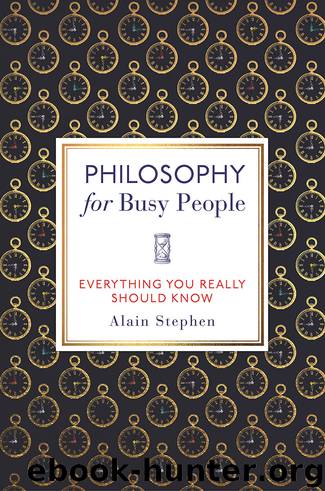Philosophy for Busy People by Alain Stephen

Author:Alain Stephen
Language: eng
Format: epub
Publisher: Michael O'Mara
• Prison surveillance apparatus and Jeremy Bentham’s development in the eighteenth century of the ‘panopticon’.
• School discipline structures. Systems for the administration and control of populations.
• The promotion of norms about bodily conduct, including sex.
Foucault also drew upon psychology, medicine and criminology in order to define what constitutes norms of behaviour and deviance in the eyes of society. For Foucault, physical bodies are subjugated and made to behave in certain ways, as a microcosm of social control of the wider population, through what he called ‘bio-power’. Disciplinary and bio-power combine to create discourses and discursive practices around what is accepted in society and what is excluded or repressed.
One of the main aspects of Foucault’s notion of power is that in a sense it transcends the normal transparent exercise of political power. Foucault sees power as an everyday, socialized and embodied phenomenon, yet at the same time elusive and often removed from our perception of how it is operating to such an extent that individuals readily conform to norms of behaviour without the need of wilful coercion.
Foucault, however, did not argue that social conditioning couldn’t be challenged and he believed in possibilities for action and resistance. He was an active social and political commentator and one-time member of the French Communist Party – and a prominent gay-rights activist – who saw a role for the ‘organic intellectual’ in social and political struggles. One key aspect of Foucault’s ideas on political action concerned the capabilities and methods through which we identify and analyze socialized norms and constraints. For Foucault, to challenge power effectively did not entail unearthing ‘absolute truth’ – which is merely a socially constructed form of power – but ‘of detaching the power of truth from the forms of hegemony, social, economic, and cultural, within which it operates at the present time’. In order for power to function it requires two aspects: a discourse (or discursive practice) and an institution, social or political. However, alternative discourses can spring up in opposition:
Download
This site does not store any files on its server. We only index and link to content provided by other sites. Please contact the content providers to delete copyright contents if any and email us, we'll remove relevant links or contents immediately.
Hit Refresh by Satya Nadella(9136)
When Breath Becomes Air by Paul Kalanithi(8447)
The Girl Without a Voice by Casey Watson(7889)
A Court of Wings and Ruin by Sarah J. Maas(7847)
Do No Harm Stories of Life, Death and Brain Surgery by Henry Marsh(6941)
Shoe Dog by Phil Knight(5269)
The Rules Do Not Apply by Ariel Levy(4969)
A Higher Loyalty: Truth, Lies, and Leadership by James Comey(4964)
Hunger by Roxane Gay(4928)
Tuesdays with Morrie by Mitch Albom(4784)
Everything Happens for a Reason by Kate Bowler(4743)
The Immortal Life of Henrietta Lacks by Rebecca Skloot(4588)
Millionaire: The Philanderer, Gambler, and Duelist Who Invented Modern Finance by Janet Gleeson(4478)
How to Change Your Mind by Michael Pollan(4357)
All Creatures Great and Small by James Herriot(4322)
The Money Culture by Michael Lewis(4207)
Man and His Symbols by Carl Gustav Jung(4137)
Elon Musk by Ashlee Vance(4127)
Tokyo Vice: An American Reporter on the Police Beat in Japan by Jake Adelstein(3996)
